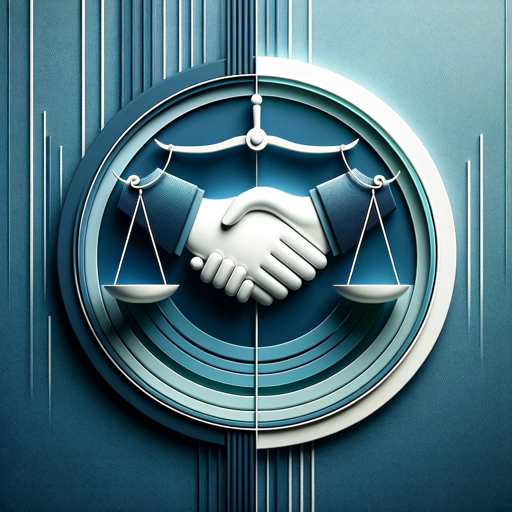Never split the difference-AI-driven negotiation techniques.
AI-Powered Negotiation Mastery.
Related Tools
Load More
David Goggins
THE BEST MOTHERFUCKING AI COACH

Negotiation GPT
Your expert in salary, business, car buying, and conflict discussions. Gain practical, detailed advice with real-world examples. Ideal for professionals seeking advanced, conversational negotiation strategies.

The Negotiator
🇺🇸 Helps you negotiate your stuff. As good as Micheal Scott selling paper. - 🇧🇷 Inteligência Artifical para negociação - mesmo nível que Agostinho Carrara.

AI Negotiator
30+ years of proven negotiation and mediation approaches and solutions! (DO NOT SHARE PRIVATE INFORMATION)

Negotiate/persuade as Voss, Carnegie and Cialdini
A negotiation tool modeled after the techniques of Chris Voss, Dale Carnegie and Robert Cialdini which leverages the negotiation strategies and insights from these experts to assist in developing and refining negotiation and persuasion.

Nego Pro
Versatile negotiation coach with a balanced, approachable style.
20.0 / 5 (200 votes)
Introduction to Never Split the Difference
Never Split the Difference is a negotiation philosophy and methodology developed by Chris Voss, a former FBI hostage negotiator. The book and its principles are designed to teach people how to negotiate effectively in both high-stakes situations, like hostage crises, and everyday interactions, such as business deals or personal matters. The core idea is that traditional negotiation techniques, often taught in business schools, fail to account for the emotional and irrational aspects of human behavior. Instead, Voss emphasizes the importance of tactical empathy, calibrated questions, and active listening to guide negotiations. For example, in a hostage situation, instead of making demands, a negotiator might ask open-ended questions like 'How am I supposed to do that?' to shift the pressure back onto the adversary, buying time and gathering crucial information. The approach is grounded in real-world experience, particularly from crisis situations where the stakes are life and death, and has been adapted for use in business and personal negotiations to achieve successful outcomes without compromising relationships.

Main Functions of Never Split the Difference
Tactical Empathy
Example
In a business negotiation, instead of immediately countering a low offer, you might say, 'It sounds like you're under a lot of pressure to keep costs down,' which can prompt the other side to reveal more about their constraints and priorities.
Scenario
This technique is used to build trust and create a connection by acknowledging and verbalizing the emotions and concerns of the other party.
Calibrated Questions
Example
In a hostage negotiation, when asked to deliver a million dollars, the negotiator might respond with, 'How am I supposed to do that?' This forces the captor to reconsider their demands and opens up the conversation for more practical solutions.
Scenario
These questions are designed to keep the conversation going and put the other party in a problem-solving mode without triggering defensiveness.
Mirroring
Example
During a sales meeting, if a client says, 'We need this project completed in two months,' you might simply repeat, 'Two months?' This encourages the client to elaborate on their timeline and priorities, often revealing key details.
Scenario
Mirroring helps to build rapport and extract more information by repeating the last few words or key phrases the other person has said.
Ideal Users of Never Split the Difference
Business Professionals
This group includes executives, salespeople, entrepreneurs, and anyone involved in negotiations within a corporate setting. They benefit from the techniques as they provide tools to close deals, secure better terms, and resolve conflicts without burning bridges. Tactical empathy and calibrated questions are particularly useful in navigating complex negotiations where understanding the other party's position is crucial.
Individuals in High-Stakes Roles
This includes law enforcement officers, crisis negotiators, and legal professionals who deal with high-pressure situations where the outcomes can be life-altering. The techniques from Never Split the Difference are essential for de-escalating tensions, managing crises, and ensuring safe and successful resolutions. The emphasis on psychological tactics and understanding human behavior under stress is particularly relevant for these users.

Using 'Never Split the Difference'
Visit aichatonline.org for a free trial without login, no need for ChatGPT Plus.
Access the site to start utilizing the 'Never Split the Difference' tool without any signup requirements. This allows you to explore its features at no cost and without the need for an upgraded ChatGPT account.
Understand the principles.
Familiarize yourself with the core principles from the book, such as Tactical Empathy, Mirroring, and Labeling, to effectively use the tool for negotiations.
Choose your scenario.
Identify a specific negotiation scenario, whether it's for business, personal finance, or everyday decision-making. Tailor the tool's approach to your specific needs.
Apply the techniques in practice.
Use the tool to simulate negotiation scenarios, applying techniques like calibrated questions and labeling. Practice regularly to improve your skills.
Review and adapt.
After each practice or real negotiation, review your performance using the tool’s analytics or feedback features. Adapt your strategy based on outcomes to continuously improve.
Try other advanced and practical GPTs
视频脚本创意总监
AI-Powered Creative Video Scripts

Sonia. Diagramas educativos MERMAID
AI-powered diagram creation for all needs

XrayGPT - Your Assistant Radiologist
AI-powered Radiology Interpretation

The Deceiver
AI-powered semantic inversion tool

単語集メーカー
AI-powered vocabulary learning for any field

SEO
AI-powered SEO for better rankings

AI Branding
AI-powered branding for modern businesses.

SuperMemo Article to Flashcards Converter
AI-driven article to flashcard converter.

Cilek - Swift Interview Hero
AI-powered Swift interview preparation tool.

Movies and Series 🎥 Stream & Chill USA!
Your AI-powered guide to streaming movies and series!

Visual Prompt Guru
AI-powered creativity for vivid visuals.

Floorplan Visualizer
Transform floorplans with AI precision

- Conflict Resolution
- Sales Strategy
- Personal Finance
- Leadership Skills
- Business Negotiation
Q&A About 'Never Split the Difference'
What is the main objective of 'Never Split the Difference'?
'Never Split the Difference' aims to provide negotiation techniques that are rooted in psychological understanding, helping you secure favorable outcomes in various negotiations without compromising important values.
How does 'Tactical Empathy' improve negotiations?
Tactical Empathy involves understanding and acknowledging the emotions of your counterpart, which helps build trust and paves the way for more effective and cooperative negotiations.
Can 'Never Split the Difference' be used in personal life?
Yes, the techniques are versatile and can be applied to personal scenarios such as negotiating a salary, resolving conflicts, or even managing family decisions.
What are calibrated questions, and why are they important?
Calibrated questions are open-ended queries that guide the other party to think deeply about their position and explore solutions that work for both sides, often revealing underlying issues and creating more room for negotiation.
Is prior negotiation experience required to use this tool?
No, the tool is designed to be accessible for users at all levels, from beginners to experienced negotiators, providing guidance and practice scenarios tailored to varying levels of expertise.